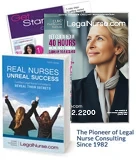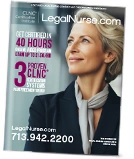Certified Legal Nurse Consultant Exam
To take the CLNC® Certification Examination, you must:
- Maintain an active RN license in the U.S. or Canada (a BSN degree is not required) and
- Complete the Basic CLNC Certification, which is included in any of the CLNC Certification Systems.
Exemptions from meeting any of these criteria will not be granted.
LegalNurse.com may change these eligibility requirements at any time without notice.
CLNC® Certification Examination
- Study the CLNC Online Certification Program.
- CLNC Certification Examination.
- You must take the examination within one year of purchasing your CLNC Online Certification Program.
- After completing your study of the CLNC Online Certification Program, complete and submit the evaluation to unlock access to the CLNC Certification Exam.
All examinations are in English. The one-and-a-half-hour CLNC Certification Examination consists of 100 multiple-choice questions. The examination tests the basic knowledge and the application of knowledge encompassing not only tasks legal nurse consultants perform, but also the ability to conduct oneself as a professional legal nurse consultant.
There’s no waiting to find out how you did. You receive your score immediately upon completing the CLNC Exam. You must receive a score of 70% or more to pass the examination. If you are successful, you will receive access to print your CLNC Certification certificate.
Taking the Online CLNC® Certification Examination.
- Once you are ready to start the test, 90 minutes are allotted for the examination itself. Answer each question to the best of your ability. If time permits after answering all the questions, you may review your examination and change any responses.
- Your examination results will be posted on your screen immediately after you complete the exam.
- If you received a passing score of 70% or greater, you will receive your CLNC Certification notice via email.
- A processing fee applies for a failed exam or failure to submit the exam within the 90-minute period.
- If you sit for the examination and do not receive a passing score, you are NOT eligible for any refund. You can retest at any time for a retesting fee.
- There are no exceptions to these requirements.
Candidates requiring special accommodations.
- LegalNurse.com wants to ensure that no individual is deprived of the opportunity to take the CLNC Certification Examination solely by reason of a disability or impairment.
- Special testing arrangements will be considered for a disability or impairment provided that requests for such arrangements are submitted with your examination application and are accompanied by documentation of the disability or impairment from a suitably licensed professional. Special testing accommodations, such as additional testing time, are scheduled subject to preapproval by LegalNurse.com. In some instances a 30-day period may be required for scheduling purposes. Only those candidates who have been granted this approval in advance will receive special accommodations during testing.
Learning Outcomes
The following identify the essential learning outcomes a CLNC consultant should possess. The CLNC consultant should be able to:
- Identify seven types of legal cases on which you can consult.
- Identify 30 specific CLNC® services you can provide to attorneys.
- List the key stages of litigation and the CLNC® consultant’s role in each.
- Identify how various legal theories affect the CLNC® consultant’s role in medical malpractice, products liability, toxic tort, workers’ compensation and personal injury cases.
- Identify four legal elements you must know to analyze a case.
- Develop your initial screening opinion efficiently using the screening form.
- Participate in a hands-on case evaluation workshop.
- Identify report writing strategies for presenting your legal nurse consulting opinions professionally and with confidence.
- Research and access the best authoritative information from databases and the Internet.
- Identify the sources for standards of care.
- Identify six methods of discovery.
- Describe 11 guidelines for drafting discovery.
- Apply the appropriate types of demonstrative evidence to any type of case.
- Identify strategies for testifying or assisting your attorney-client in prepping expert witnesses.
- List the sources for finding qualified testifying experts.
- Apply the steps for working effectively with experts.
- Compare contracts and letters of agreement for subcontractors, experts and attorney-clients.
- Recognize conflicts of interest.
- Examine confidentiality issues affecting the CLNC® consultant.
- Identify the appropriate methods for locating attorney-clients.
- Create a marketing plan.
- Identify strategies for creating successful client interviews.
- Respond to 18 common interview questions.
- Identify how to set up and manage a legal nurse consulting business.
Testing Blueprint
A testing blueprint identifies areas of knowledge that might be tested, along with the approximate percentage of questions in each content area. The following testing blueprint outlines topics that might be included on the CLNC Certification Examination, along with a percentage representing the approximate proportion of examination questions related to each content area.
- The Role of the Certified Legal Nurse Consultant – 9%.
- Types of cases on which legal nurse consultants are qualified to consult.
- Distinctions between the testifying expert (TE) and the consulting expert (CE).
- Scope of practice of the CLNC consultant.
- The Litigation Process – 7%.
- Pre-litigation phase of a lawsuit.
- Phases of litigation.
- Methods of discovery.
- Alternative dispute resolution.
- Variables that affect who wins.
- Theories of Liability and Defenses Used in Medical-Related Cases – 9%.
- Intentional tort.
- Negligence.
- Strict liability.
- Anatomy of Personal Injury, Products Liability, Toxic Tort and Workers’ Compensation Cases – 6%.
- General personal injury and medical malpractice.
- Products liability.
- Toxic tort cases.
- Work-related injuries.
- How to Screen Medical-Related Cases Effectively and Efficiently – 9%.
- The significance of screening.
- Persons who screen medical malpractice cases.
- Legal elements of a medical-related case.
- Factors that affect the initial screening opinions of attorneys and insurance companies.
- What Certified Legal Nurse Consultants need to screen a case.
- Potential defendants.
- Principles of screening.
- Case screening form.
- Plaintiff alert situations.
- Cases plaintiff attorneys frequently reject and defensible cases.
- Comprehensive Case Evaluation Strategies and Report Writing Techniques – 9%.
- Steps for evaluating medical malpractice and medical-related cases.
- Report writing – medical malpractice and other medical-related cases.
- How to Research Medical-Related
Cases – 6%.- Selecting the best source of information.
- Search results and search strategies.
- Databases and other resources.
- Database vendors and selection.
- Information brokers.
- Document delivery.
- Standards of Care – 5%.
- Sources indicative of standards of care.
- Obtaining standards and guidelines.
- Use of standards of care in the courtroom.
- Analyzing policies and procedures of the defendant healthcare facility.
- Helping Attorneys with Discovery – 4%.
- Guidelines for drafting interrogatories and requests for production.
- Types of interrogatories directed to defendants.
- Types of requests for production directed to defendants.
- Types of interrogatories directed to plaintiffs.
- Types of requests for production directed to plaintiffs.
- Helping Attorneys Develop Demonstrative Evidence – 4%.
- Definitions.
- Purpose of demonstrative evidence.
- Media used for demonstrative evidence.
- Principles of conceptualizing and developing demonstrative evidence.
- Working with a graphics consultant.
- Admissibility of demonstrative evidence.
- The Role of the Nurse as a Testifying Expert – 5%.
- Who testifies and why?
- Communicating with the attorney-client.
- Preparing for deposition and trial.
- What to expect during deposition and trial.
- Strategies for testifying.
- Locating and Working with Testifying Experts – 4%.
- Assessing qualifications of potential TEs.
- Sources for locating TEs.
- Brokering TEs for law firms.
- Working effectively with TEs.
- Communicating with potential TEs.
- Types of TEs used in medical-related cases.
- Fees for locating expert witnesses.
- How to Formulate and Negotiate Contracts – 4%.
- Contracts.
- Common clauses.
- Negotiating strategies.
- Contract drafting strategies.
- Legal and Ethical Issues – 5%.
- Liability issues.
- Conflicts of interest.
- Confidentiality.
- Developing a Marketing Strategy – 7%.
- Elements of effective marketing.
- Planning for success.
- Committing to quality, excellence and service.
- Creating and projecting a winning brand and image.
- Effective marketing strategies.
- Successful Interview Strategies – 3%.
- Preparation.
- Interview concepts.
- Closing.
- Evaluation of performance.
- Business Development Principles – 4%.
- Setting up and managing your CLNC business for profitability.
- Professional services and resources you’ll need.
- Choosing the right business structure.
- Office space.
- Office equipment and furniture.
- Tax deductible items.
- Information management, storage and retrieval.
- Expanding your CLNC business through CLNC subcontractors.
- Business management strategies.
- Negotiating your fee to earn what you are worth.
- Billing and collection.
The above outline is not an all-inclusive review of the scope of the Certified Legal Nurse Consultant’s knowledge, but is provided to help you evaluate your own level of knowledge.





